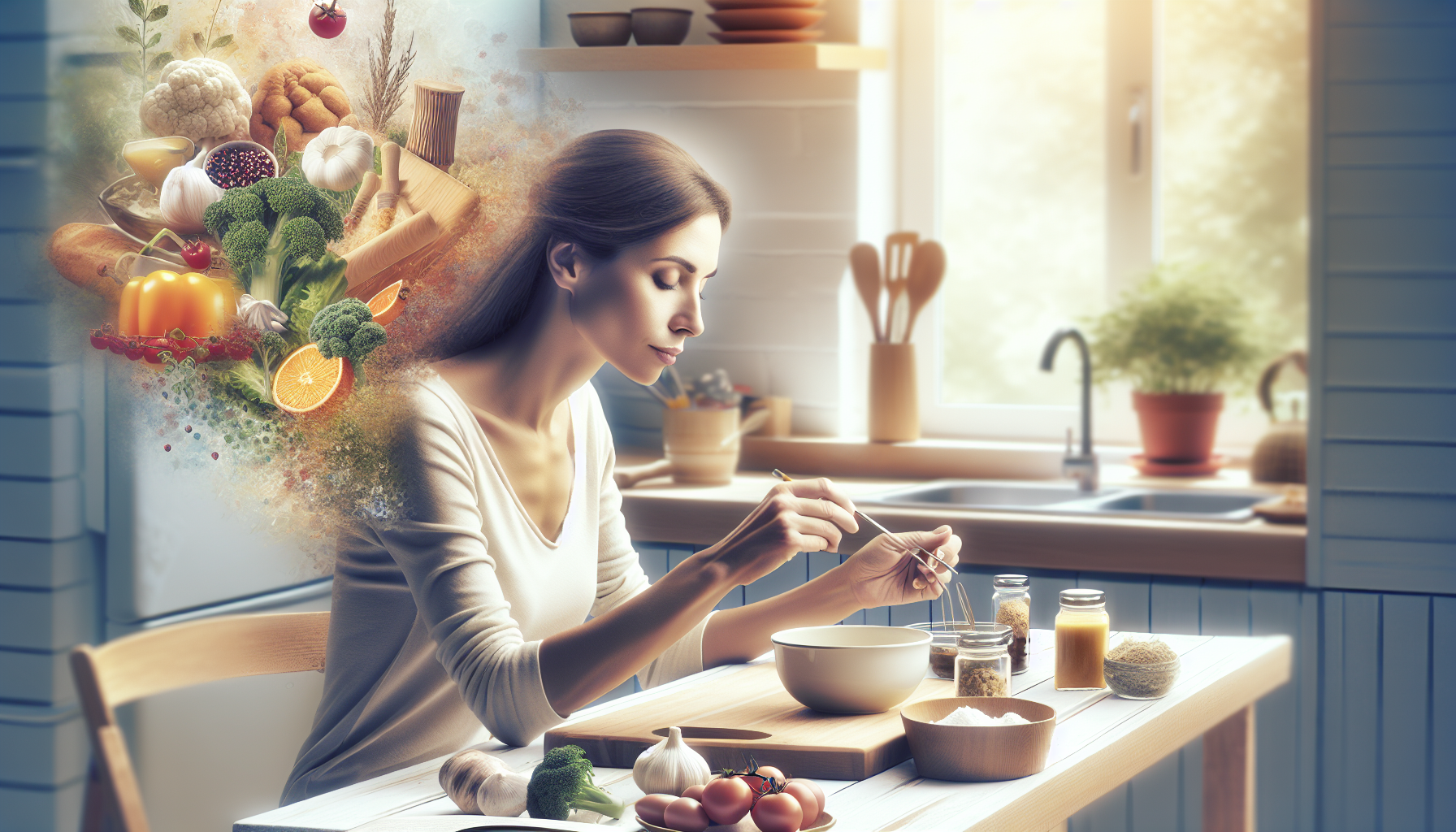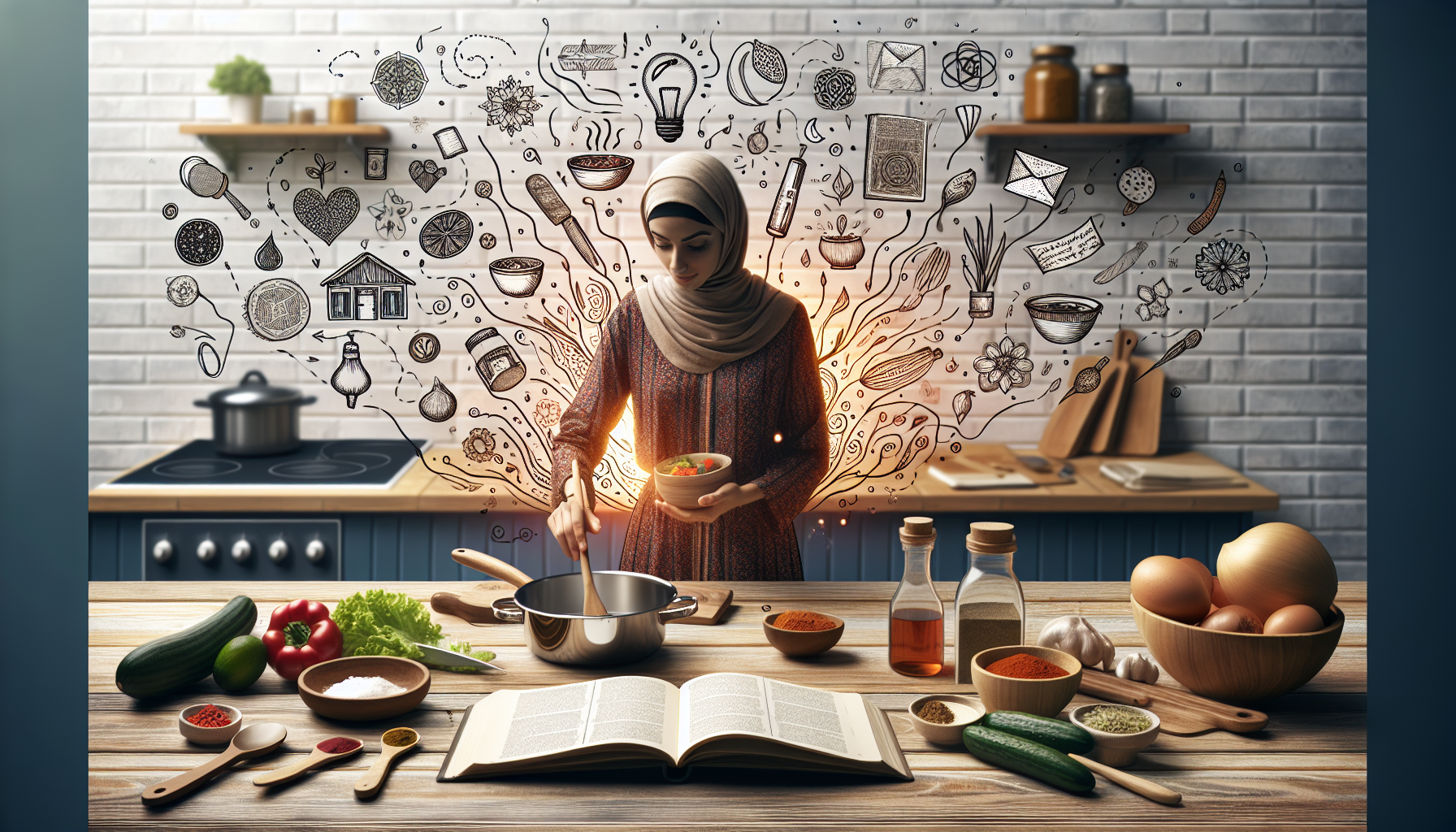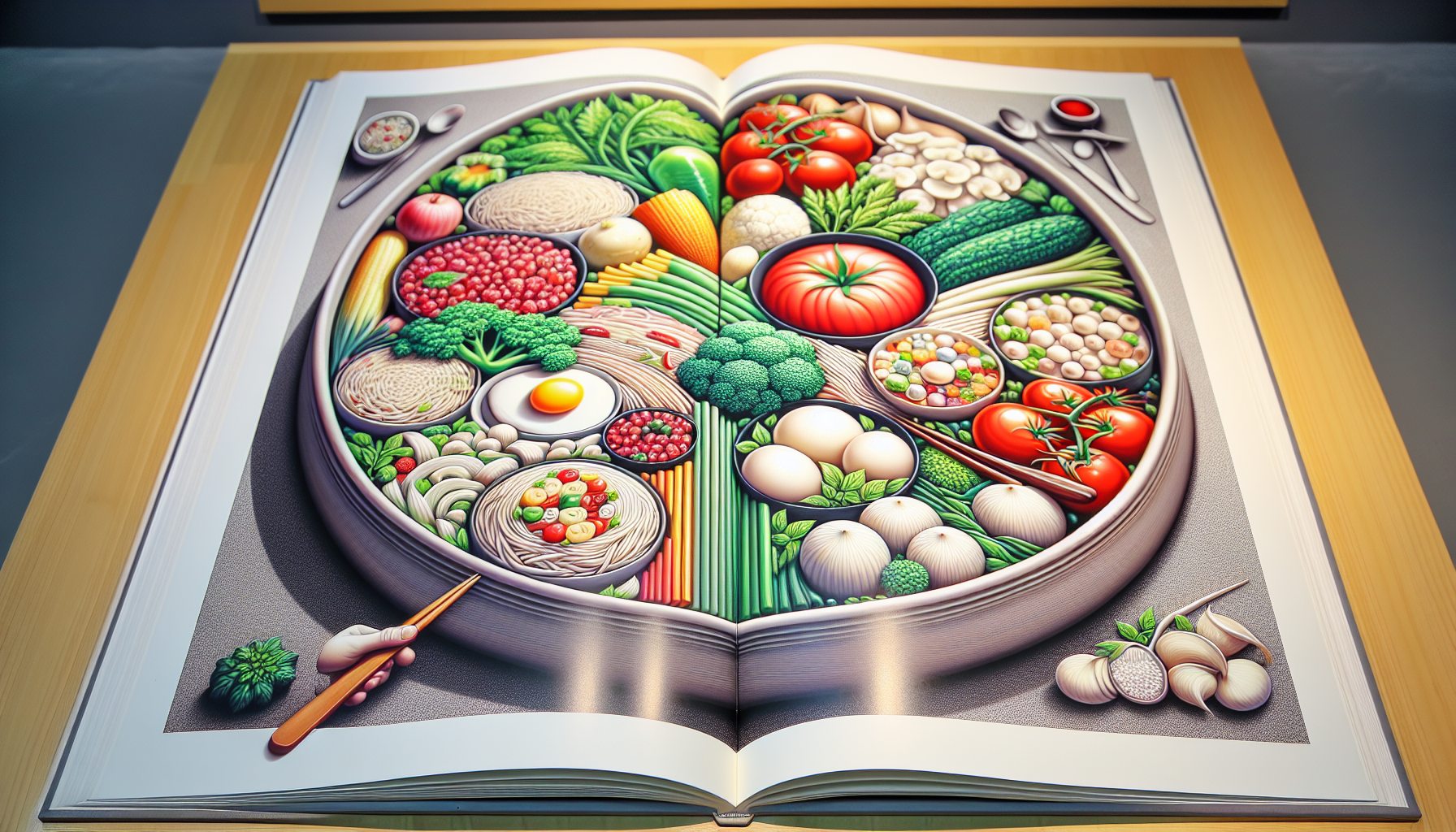Have you ever considered the benefits of cooking alone? In our fast-paced, social media-driven world, solo cooking may seem like a solitary activity, but it can do wonders for your culinary skills. By embarking on a self-guided culinary journey, you have the freedom to experiment, take risks, and truly focus on honing your skills. Without the distractions of others, you can fully immerse yourself in the art of cooking, leading to a greater understanding of flavors, techniques, and ingredients. So, why not grab your apron and embark on this solo cooking adventure that may just transform your cooking abilities and unleash your inner chef?
The Benefits of Solo Cooking
Increasing Independence in the Kitchen
Solo cooking can greatly enhance your independence in the kitchen. When you cook alone, you have the freedom to choose the recipes you want to try and the ingredients you want to use. You have the power to make all the decisions, from grocery shopping to meal planning, without any external influence. This increased independence allows you to take charge of your kitchen and develop your own cooking style.
Developing Self-Reliance in Meal Preparation
Cooking alone encourages self-reliance in meal preparation. By relying on yourself to plan, shop, and cook, you become more self-sufficient in meeting your nutritional needs. The process of preparing meals from start to finish on your own teaches you to be resourceful and inventive in creating delicious, satisfying meals. Through solo cooking, you develop the skills necessary to nourish yourself and become less reliant on takeout or pre-packaged meals.
Improving Time Management Skills
Solo cooking is an excellent way to improve your time management skills. When you cook alone, you are solely responsible for completing all the tasks required for meal preparation. This includes prepping ingredients, cooking multiple components simultaneously, and ensuring everything is cooked and plated at the right time. As you consistently practice cooking alone, you develop efficient time management techniques, allowing you to handle multiple tasks with ease and precision.
Enhancing Creativity
Experimenting with New Flavors and Ingredients
Cooking alone opens up a world of possibilities for experimenting with new flavors and ingredients. Without having to worry about anyone else’s preferences, you can be more adventurous in your culinary explorations. You can try new spices, herbs, and ingredients that you may not have considered before. This experimentation allows you to expand your palate and discover unique flavor combinations that will elevate your dishes to new heights.
Creating Unique and Personalized Dishes
When you cook alone, you have the freedom to create dishes that cater to your personal tastes and preferences. You can customize recipes to suit your dietary needs or experiment with your favorite ingredients to add a personal touch. This ability to create unique and personalized dishes allows you to showcase your creativity and culinary skills. Whether it’s a twist on a classic recipe or a completely original creation, solo cooking allows you to express yourself through food.
Improving Presentation Skills
Presentation is an important aspect of cooking, and solo cooking provides the perfect opportunity to improve your presentation skills. When you cook alone, you can focus on the aesthetics of your dish, taking the time to arrange it beautifully on the plate. With no distractions or time constraints, you can pay attention to the details, such as garnishes and plating techniques, that make a dish visually appealing. Through solo cooking, you can enhance your ability to create visually stunning meals that are as pleasing to the eye as they are to the palate.

Mastering Basic Techniques
Perfecting Knife Skills
Solo cooking offers the ideal environment to perfect your knife skills. With no one else in the kitchen, you can focus on proper knife techniques without any distractions. You can practice various cutting styles, such as dicing, mincing, and julienning, to achieve consistent and precise results. Through careful practice and repetition, you can become more efficient and confident in using a knife, which is an essential skill for any cook.
Mastering Cooking Temperatures
Cooking alone allows you to master cooking temperatures and control them with precision. Whether it’s searing a steak to the perfect medium-rare or simmering a sauce just right, solo cooking gives you the freedom to experiment with different heat levels and cooking times. With no one else to consider, you can focus solely on mastering the art of temperature control, ensuring that each dish is cooked to perfection.
Understanding Ingredient Pairings
Solo cooking provides an opportunity to deepen your understanding of ingredient pairings. As you experiment with different flavors and ingredients, you’ll begin to develop a sense of which flavors complement each other and create harmonious combinations. This understanding of ingredient pairings will enable you to create balanced and flavorful dishes that highlight the natural qualities of each ingredient. Through solo cooking, you’ll become more knowledgeable about how different flavors interact and how to create harmonious flavor profiles.
Learning From Mistakes
Understanding the Cause and Effect of Flaws
Cooking alone allows you to learn from your mistakes and understand the cause and effect of flaws in your dishes. When a dish doesn’t turn out as expected, you have the opportunity to analyze what went wrong and make adjustments for the next time. You can experiment with different techniques or ingredients to troubleshoot and improve your cooking skills. This process of trial and error helps you develop a deeper understanding of the culinary arts and refine your cooking techniques.
Developing Problem-Solving Abilities
Solo cooking challenges you to develop problem-solving abilities in the kitchen. When you encounter unexpected obstacles or ingredient substitutions, you must think on your feet and find creative solutions. This process of adaptability and problem-solving transfers into other areas of life as well, helping you become more resourceful and resilient in the face of challenges. Solo cooking teaches you to think critically and find innovative solutions to overcome any culinary hurdles.
Adapting and Improvising with Limited Resources
Solo cooking allows you to adapt and improvise with limited resources, which is an invaluable skill in the kitchen. Whether you’re missing a key ingredient or don’t have access to certain tools, solo cooking teaches you to think outside the box and find alternatives. You learn to make the most of what you have and create delicious meals with limited resources. This ability to adapt and improvise not only enhances your cooking skills but also helps you become more flexible and creative in other aspects of life.

Gaining Confidence in the Kitchen
Building Competence in Various Cooking Methods
Solo cooking builds your competence in various cooking methods. As you experiment with different recipes and techniques, you become more skilled in baking, sautéing, grilling, and many other methods of cooking. The more you practice and refine your skills, the more confidence you gain in your abilities as a cook. This increased competence empowers you to tackle more complex recipes and take on culinary challenges with ease.
Expanding Culinary Knowledge and Repertoire
Cooking alone provides the opportunity to expand your culinary knowledge and repertoire. Without the influence of others, you can explore different cuisines, learn about new ingredients, and discover traditional recipes from around the world. This exploration broadens your culinary horizons and exposes you to a variety of flavors and techniques. Through solo cooking, you’ll become more knowledgeable about the vast world of food and expand your repertoire of recipes that you can prepare with confidence.
Taking Pride in Self-Sufficiency
Solo cooking instills a sense of pride and self-sufficiency. When you can prepare delicious meals on your own, you gain a sense of accomplishment and independence. The ability to nourish yourself and others through cooking is empowering and fosters a sense of self-worth. Solo cooking allows you to take control of your culinary destiny and become a self-sufficient cook who can create delectable dishes from scratch.
Improving Organizational Skills
Planning and Executing Meal Preparation
Solo cooking improves your organizational skills, particularly in planning and executing meal preparation. When you cook alone, you need to plan your meals in advance, considering factors such as ingredients you have on hand, cooking times, and dietary preferences. This process requires careful thought and organization to ensure a smooth cooking experience. Moreover, you must execute your meal preparation efficiently, coordinating multiple tasks simultaneously. Through solo cooking, you’ll develop the ability to plan and execute your meals flawlessly, saving time and reducing stress in the kitchen.
Managing Ingredients and Equipment
Cooking alone teaches you to manage ingredients and equipment effectively. You’ll learn how to keep track of ingredients, ensuring you have everything you need for a recipe while minimizing waste. Additionally, you’ll become proficient in using and maintaining various kitchen tools and equipment. Solo cooking encourages you to stay organized and have a well-stocked pantry, enabling you to efficiently prepare meals without any last-minute hiccups.
Streamlining Cooking Processes
Solo cooking promotes the streamlining of cooking processes, making you more efficient in the kitchen. As you gain experience cooking alone, you’ll develop strategies to simplify and optimize your cooking routines. From mise en place (prepping all ingredients in advance) to multitasking, you’ll discover ways to save time and energy while still producing delicious meals. This ability to streamline cooking processes allows you to enjoy the benefits of solo cooking without feeling overwhelmed by the tasks at hand.
Appreciating the Joy of Cooking
Finding Relaxation and Stress Relief
Solo cooking provides a space for relaxation and stress relief. The act of preparing a meal can be soothing and therapeutic, allowing you to focus on the present moment and escape from the stresses of daily life. Cooking alone gives you the freedom to go at your own pace, enjoy the process, and savor every step. It becomes a form of self-care and a way to recharge and rejuvenate.
Rediscovering the Pleasure of Food
Cooking alone allows you to rediscover the pleasure of food. Without any external influences, you can truly savor and appreciate the flavors and textures of the dishes you create. You have the freedom to experiment with seasonings and cooking techniques to enhance the taste of your meals. Solo cooking brings you closer to the food itself, encouraging mindful eating and a deeper connection to the culinary experience.
Fostering a Sense of Achievement
Solo cooking fosters a sense of achievement and fulfillment. When you cook alone and create a delicious meal from scratch, you experience a profound sense of accomplishment. The satisfaction that comes from knowing you have nourished yourself through your own culinary efforts is immeasurable. Solo cooking allows you to celebrate your achievements and feel a sense of pride in your culinary creations.
Exploring Cultural and Regional Cuisines
Broadening Culinary Horizons
Solo cooking gives you the opportunity to broaden your culinary horizons by exploring different cultural and regional cuisines. Without any restrictions or limitations, you can dive into recipes from various parts of the world, immersing yourself in new flavors, ingredients, and techniques. This culinary exploration expands your knowledge and appreciation of different cultures, creating a deeper understanding and connection to the global culinary community.
Understanding Cultural Influences on Food
Cooking alone allows you to understand the cultural influences on food. As you explore different cuisines, you’ll learn about the history, traditions, and ingredients that shape a particular culture’s culinary identity. You’ll discover how geography, climate, and cultural practices influence the flavors and techniques used in cooking. This understanding of cultural influences not only enhances your cooking skills but also deepens your appreciation for the diversity and richness of the world’s culinary heritage.
Preserving Traditional Recipes
Solo cooking provides an opportunity to preserve traditional recipes that may otherwise be forgotten. By cooking alone and delving into traditional dishes, you can keep culinary traditions alive and pass them down to future generations. Whether it’s a family recipe or a traditional dish from a specific region, solo cooking allows you to honor and preserve the culinary heritage that is an integral part of our cultural identity.
Encouraging Healthy Eating Habits
Controlling Ingredients and Nutrition
Solo cooking empowers you to take control of your ingredients and nutrition. By cooking your own meals, you have the ability to choose high-quality ingredients and control portion sizes. This control allows you to make healthier choices and prioritize nutrient-dense foods. You can eliminate excessive sugar, salt, and unhealthy fats, and instead focus on wholesome, balanced meals that nourish your body.
Experimenting with Nutritious and Balanced Meals
Cooking alone encourages you to experiment with nutritious and balanced meals. You can explore new recipes that incorporate a variety of vegetables, whole grains, lean proteins, and healthy fats. Solo cooking provides the perfect opportunity to try out different cooking methods that retain the maximum nutritional value of ingredients. By experimenting with nutritious and balanced meals, you can develop a repertoire of healthy dishes that satisfy your taste buds and fuel your body.
Promoting Mindful Eating
Cooking alone promotes mindful eating, allowing you to fully immerse yourself in the sensory experience of a meal. When you cook solo, you can take the time to appreciate the aroma, colors, and textures of the food you prepare. This heightened awareness fosters a deeper connection to the food and encourages mindful eating practices. By savoring each bite and truly enjoying the flavors, you can cultivate a healthier relationship with food and make more conscious choices in your dietary habits.
Creating Memories and Connections
Sharing Food and Experiences with Loved Ones
Solo cooking doesn’t mean you have to eat alone. One of the joys of cooking alone is the opportunity to share your creations with loved ones. Whether it’s hosting a dinner party, inviting friends over for a cooking session, or simply preparing a meal for your family, solo cooking allows you to connect with others through food. Sharing your culinary creations creates lasting memories and deepens the bond you have with the people you care about.
Nurturing Relationships through Cooking
Cooking alone can also nurture relationships through the act of preparing food for others. As you cook for loved ones, you show them care and affection, creating a sense of warmth and togetherness. Whether it’s cooking a favorite meal for a partner or baking cookies for a friend, solo cooking becomes a way to express love and create meaningful connections with others. The act of sharing your culinary skills can bring people closer and strengthen relationships.
Using Food to Celebrate Special Occasions
Solo cooking allows you to use food as a tool for celebrating special occasions. From birthdays to holidays, cooking alone enables you to create memorable meals that mark important milestones. You can plan and prepare elaborate feasts or intimate dinners, tailoring the menu to the specific occasion. By showcasing your culinary skills and incorporating sentimental touches, you can make these moments even more meaningful and unforgettable.
In conclusion, solo cooking offers a multitude of benefits that can enhance your culinary skills and enrich your overall cooking experience. From increasing independence in the kitchen to fostering a sense of achievement, solo cooking provides a unique opportunity for personal growth and culinary exploration. Whether you’re a novice cook or an experienced chef, the joy and satisfaction that come from preparing a delicious meal on your own are truly unparalleled. So, embrace the power of solo cooking and embark on a culinary journey filled with creativity, self-discovery, and delightful flavors.
